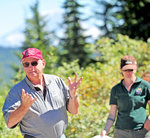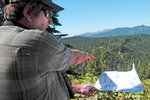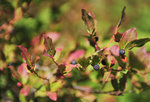



A local group has a plan to restore huckleberry fields in the Gifford Pinchot National Forest which may help commercial timber harvesting return to the forest.
The Pinchot Partners, a 501(c)(3) nonprofit focused on ecosystem management and creating local jobs, has collaborated with the Cowlitz Indian Tribe and the U.S. Forest Service to develop a huckleberry enhancement project.
Members of the Pinchot Partners come from private forestry, state agencies, the Cowlitz Tribe, environmental organizations and the general public.
Taylor Aalvik, the chair of Pinchot Partners and a member of the Cowlitz Indian Tribe, said because of the suppression of fire over the last 100 years, northwestern huckleberry fields have been invaded by subalpine trees, resulting in a decline of huckleberry fields.
He said according to Cowlitz folklore, fire is a tool; Indians would use it to encourage huckleberry growth.
Carol Chandler, a forest wildlife biologist, said parts of the Gifford Pinchot National Forest actually need to be disturbed.
These areas are “at high risk because of people loving them to death,” she said.
The Pinchot Partners are working on two huckleberry enhancement projects in the Burley Mountain area: Polepatch and Mosquito Meadows, which together comprise about 900 acres. The enhancement will involve hand thinning, commercial timber harvest and understory burning.
Formed in response to the loss of family-wage jobs and crippling unemployment — particularly in east Lewis County — the eventual goal of the Pinchot Partners is to bring back timber jobs.
Bob Guenther, a Pinchot Partners board member, described the importance of bringing industry back to rural areas.
“We’re not going anywhere,” he said. “We have the time and patience. We live here. This is our community.”
Bob Squires, also a board member and a long-time Packwood resident, said locals must work themselves to restore their communities.
“If you look at the national and congressional mood, we have to look to ourselves for resources,” he said.
He channeled a famous Mahatma Gandhi’s quote: “Poverty is the worst form of violence,” he said. “That’s what’s happening to people in rural areas. People don’t want a handout. They want to go out and do a hard day’s work.”
•••
Bianca Fortis: (360) 807-8245, twitter.com/biancafortis and facebook.com/biancafortis